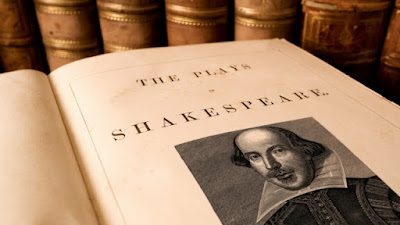Shakespeare Rant - To Teach or not to Teach?
Okay let me
preface this by saying, I’m not trying to force my opinion on anyone and I understand
if people just simply don’t like Shakespeare, that’s fine by me, obviously
people can have their own opinion and I respect that. This rant is based on a
few articles I’ve recently read and a general thought that I’ve seen going around
lately; should Shakespeare be taught in the classroom?
Shakespeare
is one of my favourite writers in both poetry and plays alike; I believe that all
his works are timeless masterpieces. His work includes enduring themes in the
arts such as Love, Betrayal, Death (a large amount of that) and his work was extremely
revolutionary for his time also dealing with issues such as Racism and Gender
fluidity. These themes are
obviously still relevant today completely disregarding the argument that “Shakespeare
is outdated” or “His works are no longer relevant to modern day”.
Furthermore,
if Shakespeare shouldn’t be taught in school, neither should history as the
Bard is a vital part of the development of the English Language and plenty of
modern works are based on Shakespeare’s classics. Let’s list a few for example.
·
West Side Story (1961) – Based on Romeo and Juliet. Star-crossed lovers (Tony and Maria) meet in opposite
sides of a racial gang feud in 1950s New York, obviously ending in tragic
fashion.
·
10 Things I Hate About You (1999) – This is pretty much a very close adaptation
of Shakespearean comedy The Taming of the
Shrew especially with the plot of an unpleasant girl being ‘tamed’ by her
love and is often referred to as one of the greatest movies of the 90s.
·
She’s the Man (2006) – Another comedy adaptation, this time of
Twelfth Night, where a girl disguises
herself as her own (fake) twin brother to join the football team but then falls
in love with a guy who is in love with her female self.
·
The Lion King (1994) – Yep, even Disney took inspiration from good
ole Will. The story of Simba’s rise to power came from Hamlet. Simba is Hamlet realising his uncle (Scar) killed his
father (Mufasa) to take the throne. Timon and Pumba is Rosencrantz and
Guildenstern and Nala is Ophelia. There’s even a ghost sequence in Disney’s classic.
·
The Lion King II: Simba’s Pride (1998) – Again, Yep. Disney took inspiration
from good ole Will for the sequel too. This one’s Romeo and Juliet; Simba’s daughter falls in love with a lion from
Scar’s pride and they must overcome their families anger toward each other to
be together. However, there’s less violence in this.
Okay so right
there are only a few examples of modern-day adaptations of Shakespeare in the
arts. Even if you don’t like those films or adaptations, you must recognise that
Shakespeare can’t be as outdated and non-relevant as it first seemed. Additionally,
even the classical plays have been shown to become modernised.
The Royal Shakespeare
Company has been modernising many plays to keep them suitable for a younger
audience and a modern generation. This includes plays such as Hamlet (using guns and set in present day),
Macbeth (starring Christopher Eccleston
and once again set in present day), Romeo
and Juliet (contemporary production based on generation of young people), Titus Andronicus (based in 2017 using the
current political landscape as inspiration) and Othello (using a modern-day military operation as a background). With
Shakespeare being used in this contemporary fashion, the thought again that
Will’s works are not use-able in today’s schooling system is absurd because it’s
clearly able to relate to.
Another argument
about Shakespeare not being taught in schools, is that it’s language is too difficult because it’s all in ‘Old
English’ and therefore difficult to read. I will admit, I understand this
criticism more than others due to my own difficulty understanding the writing
at first. However, once this language barrier is overcome, the writing is so
profound, how is it possible someone could say this is really a problem? Arguably,
his most famous quote “To be or not to be” sounds complicated at first look but
after an understanding of the meaning, it’s incredibly important as an understanding
of humanity, and gaining this understanding at the youngest possible age is
incredibly essential especially with our younger generation with the
development of social media and video games.
I could go on
and on about the importance of Shakespeare both generally for anyone to learn
and in the classroom specifically. The main point I’m trying to convey however
is that, William Shakespeare was a visionary that was so far past his time with
his writing on homosexuality, racism and gender fluidity.
With these issues being in the spotlight more than ever today, Shakespeare’s
writing is arguably more influential and relevant now than when it was originally
written, therefore meaning it is absurd to say it shouldn’t be taught in school
as it can obviously related to by today’s and even future generations.

Comments
Post a Comment